Bee Sperm Count Decreasing Due To Exposure To Pesticides, New Study Finds

A new study published Tuesday has found that some of the world’s most widely used pesticides kill most of the male drone honey bees’ sperm, a possible reason for their dwindling population.
Researchers at the Institute of Bee Health at the University of Bern, Switzerland found that even though male honeybees exposed to neonicotinoid insecticides did not die, they produced fewer living sperm cells than those who were not exposed.
The study’s lead researcher Lars Straub said the presence of the chemicals could be “one reason behind the struggling bee numbers we’ve seen over the past 15 years in the northern hemisphere.”
Neonicotinoids were introduced in the late 1980s to provide a safer alternative to older insecticides and kill pests by messing up their nervous systems. It is widely used in the U.S. while the European Commission is reviewing a temporary ban it imposed on the pesticide in 2013.
The study is the first to examine the effects neonicotinoids have on the fertility of male bees.
“Our data highlight one possible way that neonicotinoids can affect honeybees,” said senior study author Geoff Williams, a bee researcher at the university, according to National Geographic.
Drones from hives exposed to two insecticides— thiamethoxam and clothianidin— were tested. The study showed that the exposed test drones produced 39 percent fewer living sperm than their unexposed counterparts. Their sperm viability, which takes into account the percentage of living versus dead sperm, averaged 8 percent to 11 percent lower.
The queen bees store a small amount of sperm from each mating, which is then used to lay eggs for the rest of their lives. Previous research has indicated at links between neonicotinoids and the queen bee’s reproduction and survival. This new study goes a step further to link the dead sperm in the drones to the lack of reproductivity for the queen bee.
According to Straub, the reduction of sperm cells can spell trouble for the colony if the queen is unable to get viable sperm or has to leave the safety of the hive to carry out additional mating flights.
However, a spokesman for neonicotinoid-maker Bayer Crop Science, Jeffrey Donald said the firm’s scientists will review the study, but in general “artificial exposure to pesticides under lab conditions is not reflective of real-world experience,” according to the Tri-city Herald.
The researchers at Bern also maintained further studies were required to understand what the effects on sperm might mean for honeybee reproduction in the natural environment.
Even then, the new study, published in the British journal Proceedings of the Royal Society B, adds reduced sperm quality to the list of possible causes for “colony collapse disorder” in Europe, North America and other regions, making it a matter of great concern.
© Copyright IBTimes 2024. All rights reserved.






















